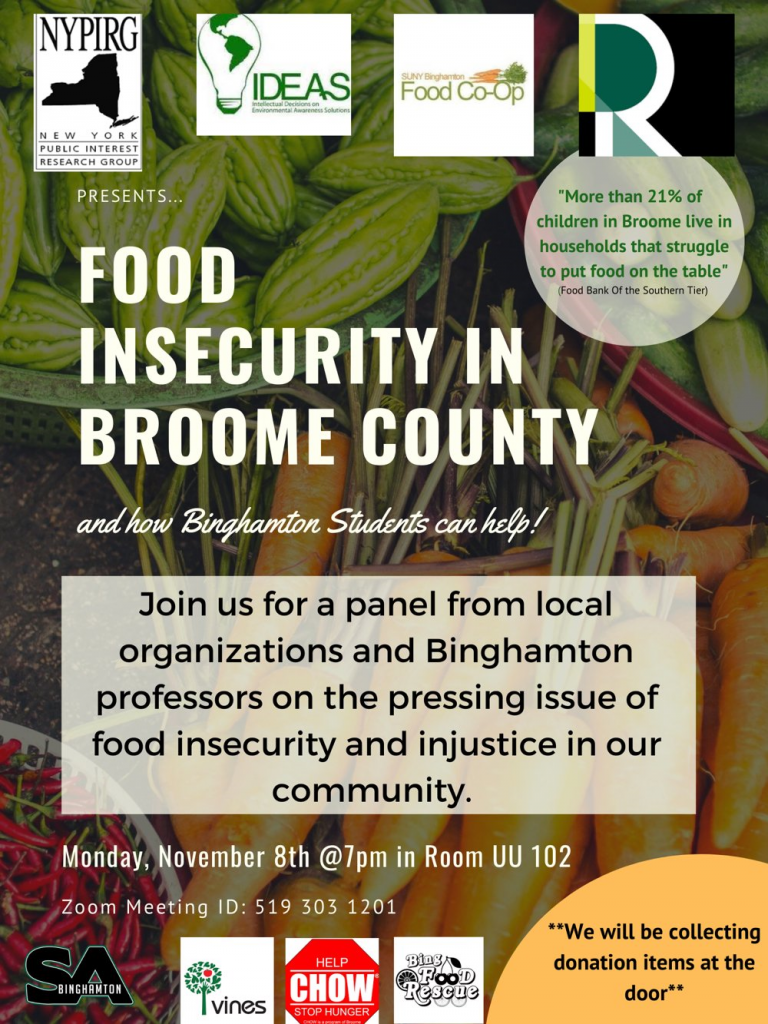
On Monday, Nov. 8, Binghamton University organizations and Sara Velardi, lecturer of environmental studies, gathered with local food organizations to discuss food inequity in Broome County.
BU student organizations New York Public Interest Research Group (NYPIRG), Intellectual Decisions on Environmental Awareness Solutions (IDEAS), the Food Co-op and the Roosevelt Network along with local community groups Volunteers Improving Neighborhood Environments (VINES) and Binghamton Food Rescue and Community Hunger Outreach Warehouse (CHOW) joined together in a panel discussing food insecurity and injustice in the Broome County region. The panel aimed to highlight the contributions of Binghamton-area organizations to solving food supply issues in the Broome County region and strategies to alleviate food shortages. More than 21 percent of Broome County households with children struggle with having enough food on the table, according to data from the official website of the Food Bank of the Southern Tier.
VINES is a local Binghamton organization that focuses on community food-growing. Jibreel Cooper, the program assistant for VINES, said at the panel that while food insecurity is a problem across the United States, it is especially prominent in the South. One quarter of children in Broome County are in a food crisis.
During the panel, Cooper said VINES’ strategy to alleviate Broome County’s food crisis is to build ownership by putting tools in local residents’ hands, providing nutrition and gardening classes, getting residents involved firsthand in growing and producing food.
“Sharing the farm is [VINES’] biggest project,” Cooper said. “VINES has partnered with two local farms to help community members eat vegetables harvested fresh within 60 miles with a weekly subscription box.”
During the panel, Cooper shared comments from consumers who have participated in the VINES Farm Share program. Consumers who participated in the VINES Farm Share project said they believed the program increased their family’s intake of vegetables while reducing the grocery bill.
A local Binghamton volunteer-run organization, Binghamton Food Rescue, presented at the panel on how to achieve food security through building a sustainable community. They proposed the creation of bridges between supermarkets and families to help community members who do not have access to adequate food.
Rachel Gallagher, the administrator of Binghamton Food Rescue, also presented on the panel. Gallagher said 40 percent of the food in the U.S. food chain is wasted and that some members of the Broome County community have limited access to fresh, healthy food.
“We provide food rescued from local farmers markets for free to individuals and organizations that do not have access to enough healthy, affordable food,” Gallagher said.
Gallagher said Binghamton Food Rescue is committed to fighting food waste and strengthening the Broome County community by connecting people with the food they deserve.
“On every single Sunday, rain or shine, we are at 85 Walnut St., [handing] out food [recovered] from local farmers,” Gallagher said.
According to Gallagher, Binghamton Food Rescue’s volunteers encompass a wide range of community members, from students to local neighbors, from children to the elderly, all working to make food and nutrition accessible.
Food insecurity has increasingly become an issue on college campuses and can be a significant barrier to student success, according to Linda Salomons, assistant director of parent and family programs and food pantry operations at BU. The BU Food Pantry provides students with a way to cope with the food crisis by equipping them with a variety of food items as well as personal care items.
To reduce the risk of exposure and to ensure the safety of students and staff, the BU Food Pantry uses an online ordering process. Students can pick up prepackaged food items by placing an order through the online ordering system once a week.
“We made a huge impact during the height of the [COVID-19] pandemic when the University closed and moved classes online,” Salomons said. “Students lost jobs and many were unable to return home, but still needed to pay their expenses, like rent, utilities, etc. Our campus Food Pantry kept its doors opened to assist students, even through the summer, and we were happy we were able to at least alleviate one burden from them.”
Ciara O’Brien, a junior double-majoring in philosophy, politics and law and environmental studies, praised the members of the panel and said they were creating positive change for local communities.
“The panel was very informative on highlighting the issues of food insecurity and injustice in our community while also showing some of the awesome work that local organizations are doing,” O’Brien said.
The food insecurity panel provided Binghamton community members with the opportunity to reach out and engage with the prevalent issue of the food crisis in the Binghamton area.


